Tag Archives: American Lobster Management Board
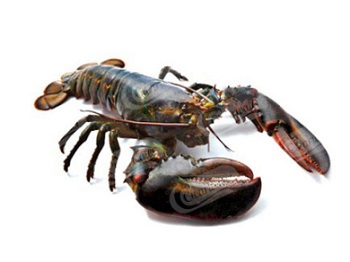
ASMFC Public Hearing on American Lobster Draft Addendum XXVII
The Atlantic coastal states of Maine through New York have scheduled hearings to gather public input on Draft Addendum XXVII to Amendment 3 to the Interstate Fishery Management Plan for American Lobster, which considers measures to increase protection of the Gulf of Maine/Georges Bank (GOM/GBK) spawning stock. Some hearings will be conducted in-person, and some hearings will be conducted via webinar. Additional details on participating in the webinars can be found later in this release. Massachusetts Virtual Hearing on March 15, 6PM The public hearing details are as follows: >Click to read< 12:17

NOAA pleads for urgency in right whale conservation, lobster gear changes
A previously unscheduled appearance before the Atlantic States Marine Fisheries Council gave the opportunity for NOAA Fisheries Assistant Administrator Janet Coit to advocate for the necessity of adapting to new lobster and crab trapping gear to save both North Atlantic right whales and the lobster industry. A deal cut by Maine legislators in a recent congressional spending bill delayed new right whale protections for six years, so the agency is looking to have its new rules set up and ready to go when that period expires. In the meantime, there’s options open to expand on-demand fishing gear so there are fewer large ropes suspended in the water. The bill allocated $26 million to ASMFC for ropeless, on-demand gear, along with monitoring and cost recovery. >click to read< 08:09
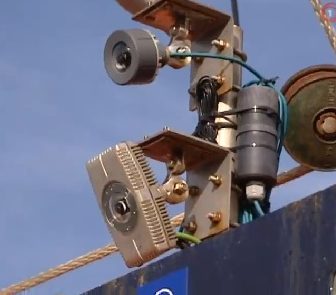
Lobstermen who harvest federal waters will be required to install electronic trackers
East Coast lobster and Jonah Crab fishermen who harvest federal waters will be required to install electronic trackers on their boats, giving federal regulators unprecedented detail on where fishing activity is taking place. A vote by the regional American Lobster Management Board approved the measure Thursday. Ware and the co-chair of the Maine Legislature’s Marine Resources Committee, Democratic Senator David Mirament, voted for the measure, over objections from the third member of Maine’s delegation, lobsterman Steve Train. >click to read< 09:32

Regulators hold off on requiring lobstermen to install electronic trackers on their boats
Regulators are holding off on a plan to require lobstermen to install electronic trackers on their boats. Members of the American Lobster Management Board Tuesday considered a raft of industry concerns about the technology’s purposes, its cost, and data-privacy, and then decided to take more time to evaluate the issues. “The lobster fishery is a difficult fishery to enforce rules in, because of the vast area we cover and the number of people,” said Steve Train, a lobsterman from Long Island, Maine, and a member of the regional board. >click to read< 17:05

“Earlier in the season it looked like it could be bad,” – Maine lobster landings down about 16% last year, commissioner says, but still beat expectations
“They caught a lot of lobsters in the last few months of the year and made up a lot of ground.” Keliher told the show’s hosts that initial landing reports suggest the lobster industry would finish 2019 with a 100 million-pound harvest. If that number holds, it would be 16 percent lower than 2018’s 119.6 million pounds landed, and nearly 15 percent less than the five-year average. On Tuesday, Keliher said Maine’s most valuable fishery, which had a dock value of $485 million in 2018, seemed to be in good shape. >click to read< 08:22
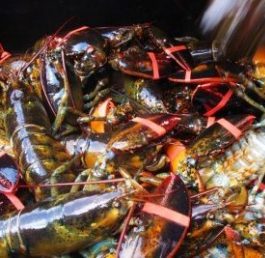
“Our landings are way off ” Maine landed less than 50 million pounds by end of September
As of the end of September, Maine fishermen had landed less than 50 million pounds of lobster, according to Commissioner Pat Keliher of Maine Department of Marine Resources. Keliher told the American Lobster Management Board on Monday that some of the year-to-date decline could be because lobsters molted late this year. The bulk of Maine’s lobster fleet catches new shell lobster, or lobsters whose new shells are just starting to firm up after shedding their old ones. “Our landings are way off. Now that doesn’t mean the sky is falling. That means we certainly had a very big delay in the shed.” >click to read< 15:39
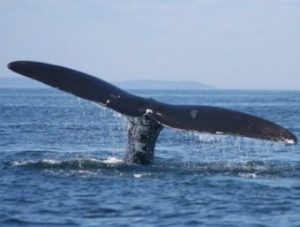
Lobstermen face more gear restrictions to protect whales
Nearly everywhere but up inside Maine’s many bays, fisheries regulators have forced lobstermen to use sinking rather than floating rope for the groundlines that connect traps on the sea bottom, to limit the number of traps set on a trawl to reduce the number of vertical buoy lines in the water and to install “weak links” in those vertical lines so an entangled whale can break loose. All those mandates, which arose out of discussions at NOAA’s Atlantic Large Whale Take Reduction Team (ALWTRT), were hard-fought, expensive and largely unpopular. >click to read<11:22
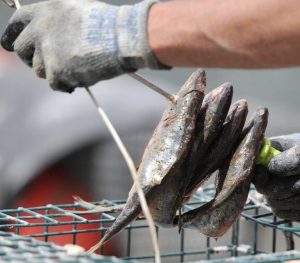
Regulators moving to ban exotic bait that could threaten lobster fishery
The American Lobster Management Board took a first step toward adopting regional bait safety rules, voting Monday to develop a resolution to prohibit the use of exotic baits that could introduce disease, parasites or invasive species to East Coast waters.,, The board – which is part of the Atlantic States Marine Fisheries Commission – agreed to develop a bait safety resolution based on Maine’s rules that all lobstering states would enact by 2020 – a quick but voluntary fix. >click to read<09:36
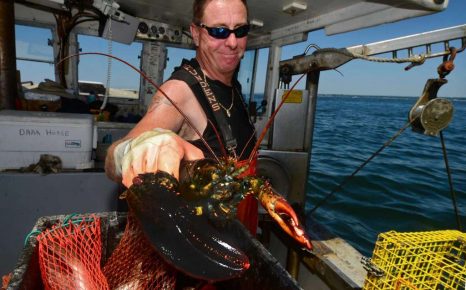
L.I. Sound lobstermen avoid regulatory pincers
Lobstermen working Long Island Sound dodged new limits on their fishery last week when federal regulators failed to adopt restrictions aimed at reversing a decades-long decline in the lobster population. An arm of the Atlantic States Marine Fisheries Commission voted down additional management measures, including a reduction in the size of lobster that could be harvested and a shorter season. “We are ecstatic,” said Mike Kalaman, a Norwalk lobstermen who believes the population is returning on its own, thanks to cleaner water and natural cycles. “We keep telling them that what’s in place is working,” Kalaman said. “If it’s not broke, don’t fix it. It’s fixing itself.” The decision by the American Lobster Management Board to defeat fishing restrictions was unusual; the board almost always adopts new management measures. The proposal on the table, developed by experts after months of research and deliberation, failed after numerous votes by a divided board. click here to read the story 08:20
RI And MA Lobstermen At Odds With Regulators Over Conservation Efforts – click here to read the story
Draft plan unveiled to curb Southern New England lobster declines
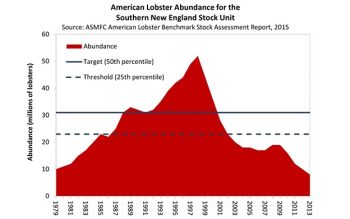 The American Lobster Management Board has released a draft plan responding to declining stocks of lobsters in Southern New England waters that will be considered by the Atlantic States Marine Fisheries Commission at its annual meeting in late October. The proposal presents a suite of management measures to increase egg production and lower harvesting mortality through a combination of management tools that include season closures, trap limits and reductions and changes in escape vent and lobster size regulations. The goal is to increase egg production for lobsters in Southern New England waters from zero to 60%. The draft responds to the 2015 American lobster benchmark stock assessment that found the Southern New England “stock severely depleted and undergoing recruitment failure with poor prospects of recovery,” according to Friday’s statement from ASMFC. Read the rest here 11:13
The American Lobster Management Board has released a draft plan responding to declining stocks of lobsters in Southern New England waters that will be considered by the Atlantic States Marine Fisheries Commission at its annual meeting in late October. The proposal presents a suite of management measures to increase egg production and lower harvesting mortality through a combination of management tools that include season closures, trap limits and reductions and changes in escape vent and lobster size regulations. The goal is to increase egg production for lobsters in Southern New England waters from zero to 60%. The draft responds to the 2015 American lobster benchmark stock assessment that found the Southern New England “stock severely depleted and undergoing recruitment failure with poor prospects of recovery,” according to Friday’s statement from ASMFC. Read the rest here 11:13
Long Island lobstermen oppose closures, question how regulators are making their decisions.
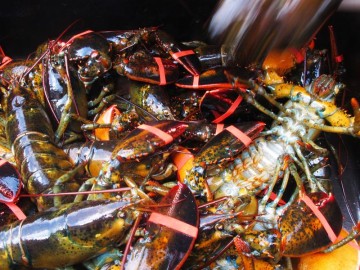 Long Island lobstermen, already straining under the weight of a seasonal closure of the Long Island Sound and sharply reduced lobster populations, face the potential for more closures as federal regulators work to rebuild a depleted stock. At a meeting of the Atlantic States Marine Fisheries Commission last week, the American Lobster Management Board agreed to review a series of new measures to address what they called the continuing decline in the Southern New England lobster fishery, which includes the . The fishery has been affected by environmental factors and fishing activity, the board said. Montauk lobsterman Al Schaffer said he and others saw a resurgence in the areas they fish around the Long Island Sound last year, though fishing is down thus far this spring. “There’s zero science,” he said, adding he strongly opposes any attempt to further restrict fishing. Read the story here 11:10
Long Island lobstermen, already straining under the weight of a seasonal closure of the Long Island Sound and sharply reduced lobster populations, face the potential for more closures as federal regulators work to rebuild a depleted stock. At a meeting of the Atlantic States Marine Fisheries Commission last week, the American Lobster Management Board agreed to review a series of new measures to address what they called the continuing decline in the Southern New England lobster fishery, which includes the . The fishery has been affected by environmental factors and fishing activity, the board said. Montauk lobsterman Al Schaffer said he and others saw a resurgence in the areas they fish around the Long Island Sound last year, though fishing is down thus far this spring. “There’s zero science,” he said, adding he strongly opposes any attempt to further restrict fishing. Read the story here 11:10


































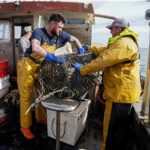
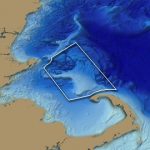




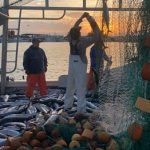

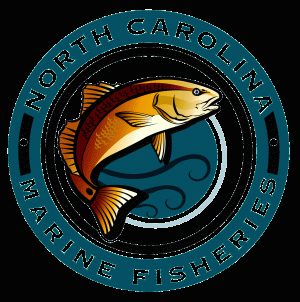






American Lobster Board Approves for Public Comment Draft Addendum XXXII to Repeal Gauge and Escape Vent Measures of Addendum XXVII
Share this post